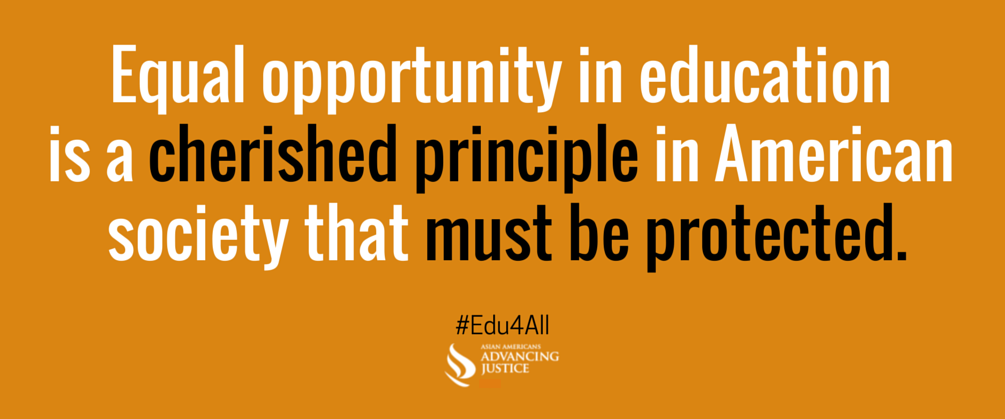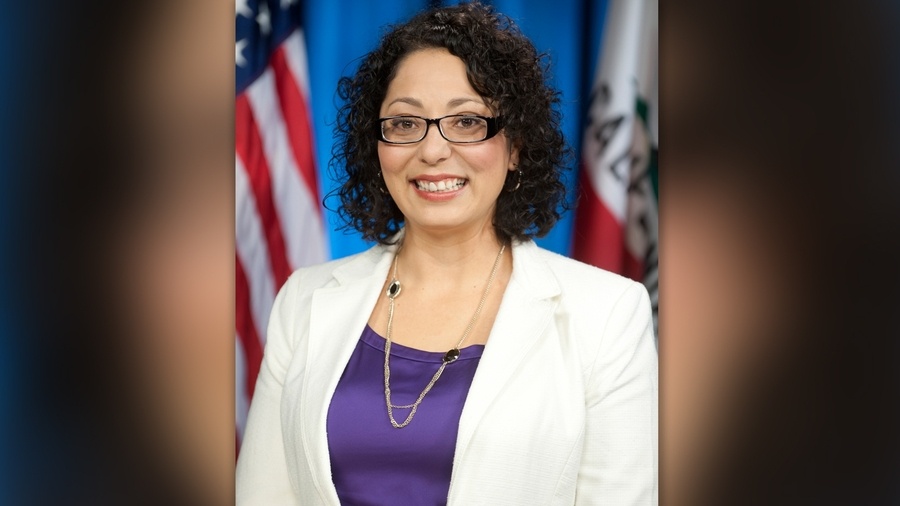Less than one week after an Asian American group (comprised of predominantly Chinese American organizations) announced that they had filed a complaint to the Department of Education against Yale University, Brown University and Dartmouth College alleging anti-Asian bias in the school’s admissions policies, the national AAPI civil rights community has responded with a clear message: these conservative Chinese American opponents of affirmative action do not speak for all us.
Today, over 150 of the nation’s AAPI civil rights organizations came together in an open letter of support for the continuation of race-conscious affirmative action. In recognition of the critical role that race-sensitive admissions has played — and continues to play — in creating access to higher education for underrepresented groups, our community’s civil rights institution has reaffirmed our unwavering defense for classroom diversity and education access for all.
The open letter’s signatories are a veritable who’s who of the AAPI civil rights community.
Signatories include some of the AAPI community’s oldest and most revered civil rights groups, including chapters of the Organization for Chinese Americans (OCA) and the Japanese American Citizens’ League (JACL), both of which are among the earliest service organizations for our community. They are joined by several other large and well-known national organizations such as Asian American Legal Defense & Education Fund (AALDEF), CAAAV, Asian Americans Advancing Justice (AAAJ), Asian Pacific Environmental Network (APEN), National Asian Pacific American Women’s Forum (NAPAWF), Center for Asian American Media (CAAM), National Asian Pacific American Bar Association (NAPABA), South Asian Americans Leading Together (SAALT), Southeast Asian American Resource Action Center (SEARAC), 18MR, and the National Council for Asian Pacific Americans (NCAPA).
Appropriately, a significant number of groups lending their name to the open letter are affiliated with our nation’s institutions of higher education. Several Asian American studies programs and Asian American student groups added their support to the open letter, including Cornell’s Asian Pacific Americans for Action (APAA), a group that I was affiliated with as an undergraduate. In addition, the letter’s signatories also include a significant number of groups representing Southeast Asian American or Pacific Islander communities — AAPI ethnic groups who remain vastly underrepresented on college campuses and who receive additional consideration under affirmative action, and yet whose voices have been largely drowned out in the debate over the continuation of race-conscious admissions.
All in all, over 150 AAPI organizations and hundreds of AAPI individuals have come together to remind the nation at-large that our ommunity supports campus diversity and race-conscious affirmative action. Most AAPIs believe in policies to improve access to jobs and education for underrepresented minorities because we recognize that these policies have helped many of us in the past, and these policies continue to help many of us and many other people of colour today. We cannot afford to allow a vocal subset of conservatives in our midst to rebuild the social, political and legal barriers that have denied so many people of colour access to higher education for far too long.
This latest show of support for affirmative action by the AAPI community comes just months after over 160 organizations joined an amicus brief in Fisher v. University of Texas II urging the Supreme Court to uphold affirmative action policies. Today’s open letter also comes one year after over 135 AAPI organizations signed a similar open letter supporting affirmative action last year.
Sadly, like last year, this open letter is likely to receive far less mainstream media attention than its anti-affirmative action counterpart. As in 2015, mainstream media is quick to write about the work of Asian Americans who oppose affirmative action, but they are reluctant to write about the counter-narrative involving a larger coalition of bigger, older, and more ethnically diverse civil rights organizations presenting an opposing opinion to conservative interests. I can’t help but wonder why mainstream media is so biased in their coverage of our community? What is it about the narrative of Asian Americans who seek to disrupt — not uphold — White supremacy that mainstream media finds so challenging to write about?
I created the #IAmNotYourWedge hashtag to aggregate my writing on affirmative action because I refuse to play into the wedge politics that perpetuate this country’s institution of White supremacy. I refuse to allow myself as an Asian American to once again be held up as the “model minority”, against which all other minorities are labeled as wanting. I refuse to permit the stereotyping of my body, or to allow those stereotypes to reinforce the oppression of other people of colour.
I will not be complicit in reinforcing racism against myself, and I will not be complicit in reinforcing the racism endured by others.
Here is the full text of today’s open letter of support for affirmative action as signed by 150+ AAPI organizations and several hundred AAPI individuals. To add your name, or your organization’s name, to the list of signatories, follow this link.
AANHPI OPEN LETTER RE AFFIRMATIVE ACTION
MAY 22, 2016We stand together as organizations across the United States representing Asian Americans, Native Hawaiians and Pacific Islanders, in strong support of race sensitive affirmative action policies in higher education.
We believe that equal opportunity is a cherished principle in American society that must be protected, and that our universities should reflect our diverse democracy and expand opportunities for students who have overcome significant barriers. Rather than letting ourselves be divided, we must come together to ensure increased opportunities and success for all students in our nation.
Affirmative action is a holistic approach that promotes diverse educational learning environments essential in our multiracial society. Affirmative action should be firmly upheld in our nation’s institutions of learning, including in Ivy League universities such as Brown, Dartmouth, and Yale.
Affirmative action does not constitute quotas
Unfortunately, there continue to be attempts by some to engage in divisive wedge politics by using misguided, misleading tactics to attack equal opportunity by calling for an end to race sensitive admissions policies at educational institutions such as Brown, Dartmouth, and Yale, as well as Harvard University and University of North Carolina at Chapel Hill. Opponents of affirmative action have wrongfully and disingenuously equated affirmative action with quotas.
The truth is that affirmative action does not constitute quotas.Affirmative action does not exclude or limit the admission of students from any specific racial or ethnic background. Indeed, the United States Supreme Court long ago prohibited quotas in the higher education admissions process, including banning limits on the admission or enrollment of any racial or ethnic group.
To be clear, we oppose quotas, discrimination, and bias against any racial or ethnic group.
Affirmative action promotes equal opportunity for all
We support affirmative action which, as noted above, does not constitute quotas, discrimination, or bias against Asian Americans.
Currently, affirmative action at universities consists of race sensitive holistic admissions policies. These policies promote equal opportunity in a society where racism still exists and racial barriers continue to unfairly limit educational opportunities for students of color. For example, our schools are more segregated today than they were in the late 1960s. Students of color, particularly African Americans, Latinos, Native Americans, Pacific Islanders, and Southeast Asians, are much more likely to attend under-resourced K-12 schools. Implicit bias and stereotyping also further impact and harm the educational learning environments and opportunities of students of color. Universities should consider these factors when reviewing applications for admissions.
All students – including Asian Americans – benefit from the racially and ethnically diverse learning environments fostered by race sensitive holistic admissions processes, including the benefits of increased cross-racial understanding, reduction of stereotyping and isolation of minority students, and training for a diverse workforce and society.
Affirmative action simply takes into account whether an applicant has overcome significant obstacles and institutional barriers, such as racial and ethnic discrimination
Affirmative action simply takes into account whether an applicant has overcome racial and ethnic adversity as one of several factors in a holistic review of an applicant’s qualifications, leadership, and potential. Holistic admissions processes also consider, for example, whether an applicant has endured poverty or is the first in her family to attend college.
Moreover, in the context of college admissions, “merit” cannot be quantified by grade point average, SAT scores, or number of activities alone. Instead, life experiences such as overcoming racial and ethnic adversity are critical factors in a student’s leadership and potential contribution to the university and to our society. In addition, numbers, like grade point averages and standardized test scores, are not colorblind and often reflect and magnify K-12 educational inequities.
Equal opportunity strengthens our democracy
Affirmative action policies help to level the playing field and promote diverse university learning environments that are essential in our multiracial and multicultural society. Our democracy benefits from a diverse and educated populace and workforce.
Those who are truly committed to equal educational opportunity should demonstrate real leadership and reinvest in higher education throughout the nation to expand access, affordability, equity, and student success. Decades of disinvestment in higher education across the country have made college less accessible for all students, especially students of color. We call for unity in standing up for the future of our diverse youth and realizing the promise of equal opportunity for all in the United States.
We also call upon our leaders in higher education institutions to uphold race sensitive affirmative action policies in their admissions processes. Especially at this pivotal time of national discourse about the need to fulfill the promise of our democratic ideals for communities of color, it is imperative that universities carry out their important role of advancing inclusion, equity, and educational opportunities for all students in our multiracial democracy.


